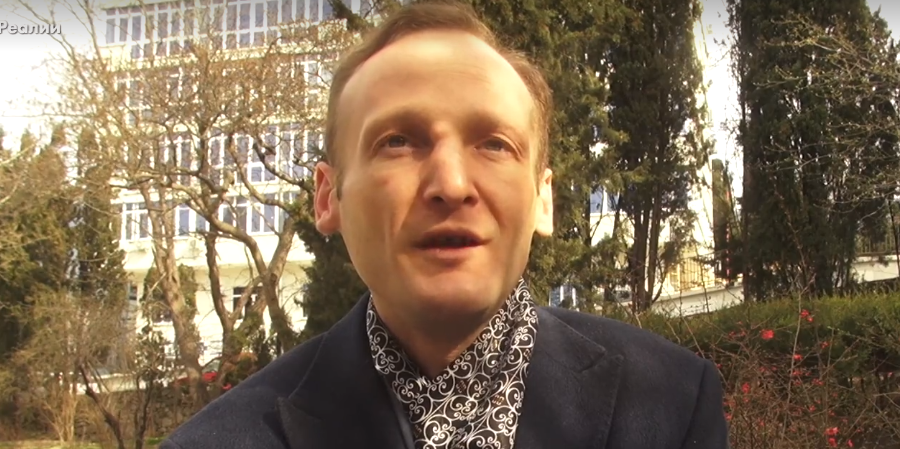Crimean journalist arrested hours after saying that Crimea needs to be saved from Russia

Crimean blogger and journalist, Yevhen Haivoronsky, was detained on 26 March, and later jailed by a Russian-controlled magistrate’s court for 12 days. The administrative prosecution was, purportedly, for being caught using a narcotic substance, however it came just hours after Haivoronsky gave the latest of several interviews recently in which he has fiercely criticized the Russian authorities and expressed support for Ukraine.
The Russian-controlled website Kryminform reported late on 26 March that the Magistrate Court in Yalta had found Haivoronsky guilty of the administrative offence of using a narcotic substance without this being prescribed by a doctor (paragraph one of Article 6.9 of Russia’s code of administrative offences). As well as the 12-day period of administrative arrest, Haivoronsky was ordered to undergo ‘treatment for drug dependence’.
The report states that Haivoronsky refused to give any explanation to the court, citing his right to remain silent under the Russian constitution, and also asserted that Haivoronsky had produced the Russian passport that he had earlier claimed had been partially destroyed by the enforcement officers during a search of his home. Kryminform asserts that Haivoronsky has recently posted comments on social media praising Ukrainian President Petro Poroshenko and criticizing the Russian authorities, including Russian President Vladimir Putin. It claims that some commentators had suggested that this was probably due to “an illness or psychological problems”, or that he is planning to move to mainland Ukraine.
Haivoronsky has made some very strong statements over the last month, and not only on social media. Some of his comments about Crimea since annexation have been much stronger than those which have already led to Ukrainians facing criminal prosecution for supposed ‘public calls to action aimed at violating Russian territorial integrity’ or similar. This apparently dramatic change in heart from a person who was a vocal supporter of Russia’s annexation and of Putin back in 2014 has led some observers, such as Iryna Sedova from the Crimean Human Rights Group, to suggest not jumping to any conclusions about his arrest. It is clear, however, Sedova notes, that journalists and bloggers who write what suits the occupation regime are not persecuted, while those who express any dissident view risk repressive measures.
It was reported on 7 March that a search had been carried out the day before of Haivoronsky’s home in Yalta. All information about the search, in which the enforcement officers removed documents, computer and electronic devices, came either from Haivoronsky himself or from pro-Russian blogger and activist, Ilya Bolshedvorov. The latter said that Haivoronsky had been tested for drugs or alcohol in his body, with nothing found.
It was after this that Haivoronsky gave a number of interviews in which, for example, he said that most Crimeans want “to return to Ukraine”. He named economic factors as the main reason, but also spoke of repression against ordinary citizens,
By 22 March, in an article entitled “A patriot whom we have lost’, the Crimean newspaper Primechania had announced that they would no longer be publishing any texts by Haivoronsky over his pro-Ukrainian statements.
As mentioned, an interview with Haivoronsky was published by Krym.Realii on 26 March. This actually begins with Haivoronsky’s words “Crimea must be saved from Russia” and again repeats that Crimeans have understood their mistake and wish to return to Ukraine.
The blogger gives a somewhat blurred account of his own very active initial support for Russia. He is from Donetsk, but came to Crimea, he says, in 2013. He reportedly worked as press-secretary for the pro-Russian ‘People’s Unity’ organization in Yalta, and in March 2014 collected signatures for the supposed ‘referendum’ on ‘joining Crimea to Russia’. He was for some time editor of two pro-Russian publications, and during his time on the first publication publicly praised Putin. He later joined ‘Primechania’ which he calls an opposition paper for its criticism of the local authorities. Primechania was possibly the only Crimean publication to have written about the Armyansk chemical spillage and the pressure and threats against Armyansk mothers to stop them talking about grave consequences for health.
In one of the above-mentioned interviews, Haivoronsky said that his support for Russia had, in fact, ended a couple of years ago, when he understood “that the entire system of state power in Russia is flawed and anti-human” and that “an unhealthy experiment has been carried out on people.”
“Russia can be seen as a kind of mental prison. People are subjected to constant torrents of harsh, obtuse propaganda from the television”. All of this prevents people from understanding what is really happening. “However in the end I understood that we had been cynically deceived, that during the time that we had lived behind a specific kind of iron wall, that very many positive changes, reforms had been taking place in Ukraine, and that the current model of Ukraine of much more healthy for society which wants to live harmoniously. I now read Ukrainian news, bloggers and feel fresh air from them”.
“I believe that Crimea is Ukraine, that Ukraine will return here and justice will triumph. We need to save Crimea, this is generally a task for mankind.”
Haivoronsky went on “to apologize to the Ukrainian state, to the Ukrainian people, to residents of civilized countries that being in Russia’s mental thralls, in some kind of aberration” he had given them some assistance. “There are very many people here who have become disillusioned with Russia, they dream of returning to Ukraine”.





